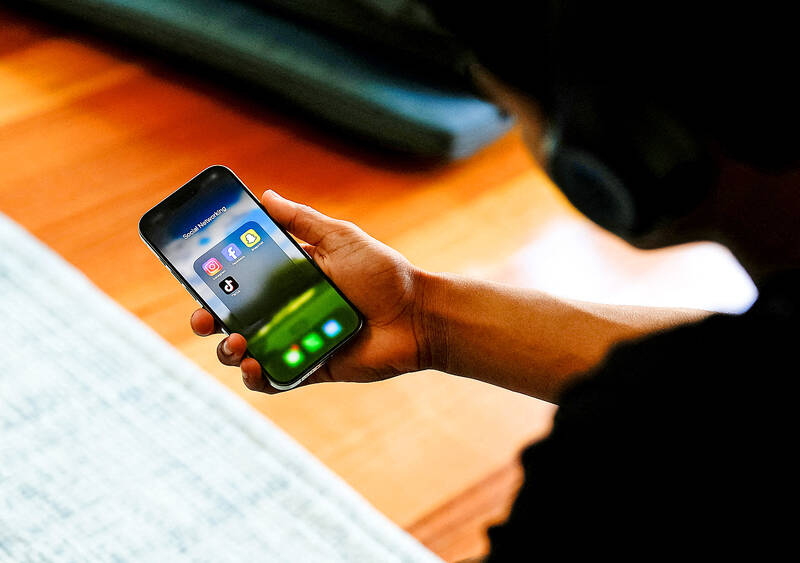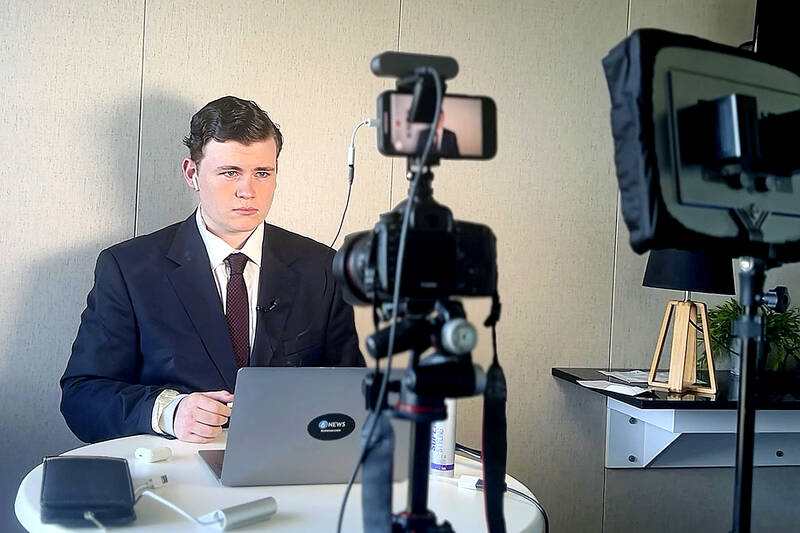Leo Puglisi was just 11 when he started an online news channel.
What was a passion project in his last year of primary school has grown into a 24/7 streaming service that has reported through bushfires and a pandemic, and featured interviews with two prime ministers.
Puglisi, now 17, has recruited 10 teenagers across Australia — almost all of whom are still in high school — to run 6 News across YouTube, X, Instagram, TikTok and a Web site.

Photo: Reuters
If the government had banned teenagers under the age of 16 from social media six years ago, his life now would be different.
“6 News wouldn’t have existed,” Puglisi says. “It would have really just taken away something I love doing. It is something I’m passionate about. It is something people turn to now as a source of news. But that would have all been stripped away.”
Last Thursday the federal government’s social media ban for under-16s passed in the Senate. The bill is introducing the term “age-restricted social media platforms” into the Online Safety Act. This will apply to platforms including TikTok, Facebook, Snapchat, Instagram, X and Reddit.

Photo: AP
While the government introduced the bill due to major concerns about the mental health effects of social media on young people, some experts are wary the ban may backfire. For some teenagers creating content online, the ban may close doors on opportunities and stifle creativity and growth, they say.
ONLINE COMMUNITIES
Puglisi’s channel has been built by teenagers as young as 13 engaging with its work then reaching out to get involved.
“They are all just other young people passionate about elections, or journalism and media, and really wanted to be able to do this,” he says.
The ban “does stifle creativity for young people,” Puglisi says. “It would just take all these opportunities away.”
Maggie Perry, 15, has been reporting for 6 News since she was 13. She says “there are just so many avenues” of opportunity for teenagers on social media – “so many infinite possibilities that just don’t exist in the real world”.
“I love having an audience to communicate my ideas [to],” Perry says. But she “mainly finds it really fun.”
“So many people have online communities … They might have niche interests but on social media there always is space for that.”
The social media ban, however, means she “wouldn’t be able to do anything for 6 News at all.”
“I wouldn’t be able to use any of my platforms, except maybe YouTube.”
Maggie, who has reported on elections, is followed on social media by MPs.
“Even they, I guess, have voted for me to be banned from social media.”
For Will Haynes, a 16-year-old musician, social media has been a way to connect with artists and listeners globally. He has been making music since he was 13, and started posting to social media shortly after.
OPENING DOORS
“It has definitely opened doors for me,” he says. “It has definitely helped me connect with so many people in the industry and different artists, and it’s also helped me expand my reach and get new people onboard.
“And there’s an element of it that I really like in the sense that you can craft your online persona and your brand as an artist.”
Haynes opened for Budjerah in March and performed with him at the Vivid festival in Sydney this year.
“I feel like both those opportunities were through social media and Gmail,” Haynes says.
“I also feel like my audience [is] sort of building in other countries … was probably thanks a lot to Instagram reels and YouTube.”
Haynes concedes there are downsides to social media.
“Constantly making content on social media is super exhausting,” he says, adding: “It can also be demoralizing if you don’t get a huge audience.”
But he says a social media ban would have “definitely impacted me as a young musician.”
“Maybe it would have allowed me to focus more on the music itself … but I definitely think in a negative way it would have been so much harder to grow.”
SAFETY ISSUES
The ban comes in response to concerns about the mental health effects of social media on young people, including issues surrounding body image, bullying and other harmful content.
The communications minister, Michelle Rowland, said while social media could be “a source of entertainment, education and connection with the world and each other” for too many young Australians it could be harmful.
Rowland also pointed to eSafety research showing parents found online safety one of their biggest challenges.
But Amanda Third, co-director of the Young and Resilient Research Center at Western Sydney University, is wary that debate has been driven by parental anxiety. She is a signatory on an open letter by social media experts to politicians raising concern the ban may be harmful.
“I know that we are not doing enough as a society to support parents to do their job, to raise children in the digital age,” she says. “But social media is firmly integrated into the everyday lives of children and young people.
“They use it to facilitate a whole range of things that support their wellbeing, their proper growth and development, their rights to participation, their health, their education, a whole bunch of different things, including having fun.”
Third says she is aware of the “very clear counter-argument that all people have been learning about themselves without social media for millennia.”
“But the fact is, our children will grow into a world where digital technologies of various kinds and social media … are dominant.
“We need to introduce them incrementally, with support and guidance into the world that they will inhabit.”

In the March 9 edition of the Taipei Times a piece by Ninon Godefroy ran with the headine “The quiet, gentle rhythm of Taiwan.” It started with the line “Taiwan is a small, humble place. There is no Eiffel Tower, no pyramids — no singular attraction that draws the world’s attention.” I laughed out loud at that. This was out of no disrespect for the author or the piece, which made some interesting analogies and good points about how both Din Tai Fung’s and Taiwan Semiconductor Manufacturing Co’s (TSMC, 台積電) meticulous attention to detail and quality are not quite up to

April 21 to April 27 Hsieh Er’s (謝娥) political fortunes were rising fast after she got out of jail and joined the Chinese Nationalist Party (KMT) in December 1945. Not only did she hold key positions in various committees, she was elected the only woman on the Taipei City Council and headed to Nanjing in 1946 as the sole Taiwanese female representative to the National Constituent Assembly. With the support of first lady Soong May-ling (宋美齡), she started the Taipei Women’s Association and Taiwan Provincial Women’s Association, where she

Chinese Nationalist Party (KMT) Chairman Eric Chu (朱立倫) hatched a bold plan to charge forward and seize the initiative when he held a protest in front of the Taipei City Prosecutors’ Office. Though risky, because illegal, its success would help tackle at least six problems facing both himself and the KMT. What he did not see coming was Taipei Mayor Chiang Wan-an (將萬安) tripping him up out of the gate. In spite of Chu being the most consequential and successful KMT chairman since the early 2010s — arguably saving the party from financial ruin and restoring its electoral viability —

It is one of the more remarkable facts of Taiwan history that it was never occupied or claimed by any of the numerous kingdoms of southern China — Han or otherwise — that lay just across the water from it. None of their brilliant ministers ever discovered that Taiwan was a “core interest” of the state whose annexation was “inevitable.” As Paul Kua notes in an excellent monograph laying out how the Portuguese gave Taiwan the name “Formosa,” the first Europeans to express an interest in occupying Taiwan were the Spanish. Tonio Andrade in his seminal work, How Taiwan Became Chinese,